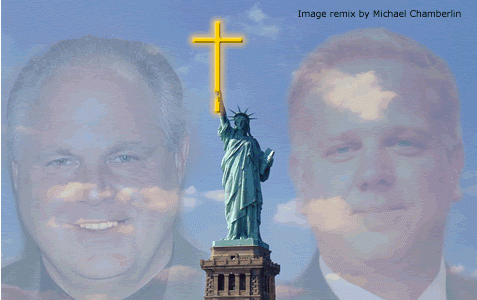From the Bill of Rights to the United States Constitution:
Amendment 1 - Freedom of Religion, Press, Expression. Ratified 12/15/1791
"Congress shall make no law respecting an establishment of religion, or prohibiting the free exercise thereof; or abridging the freedom of speech, or of the press; or the right of the people peaceably to assemble, and to petition the Government for a redress of grievances."
I agree with, and cherish, every word of it. It gives Rush Limbaugh and Glenn Beck the right to express their opinions openly, and publicly. I would have it no other way. It gives me the right to disagree with them openly, and publicly. It doesn't get any more "fair" than that. It allows Rush and Glenn to believe in the mythology of their choice, and to express their beliefs about that mythology. I would have it no other way. It gives me the right, just like it did the Father of the American Revolution, Thomas Paine, to express my reasons for not believing in their mythology. It doesn't get any more "fair" than that.
That being said, Limbaugh and Beck's opinions about the Constitution, the Founding Fathers, and the concept of separation and church and state, are moronic. Let me explain.
Let's start with Limbaugh's knowledge and understanding of the United States Constitution. By now, you've heard the flap over the question that Republican candidate for the New Jersey senate race, Christine O'Donnell, asked in a debate with opponent Chris Coons.
Following a statement, by Chris Coons, that the principles of separation of church and state are indispensable, O'Donnell challenged Coons asking, "Where in the Constitution is separation of church and state?" The law school students in the audience roared with laughter at O'Donnell's ignorance. O'Donnell's naivetà �, evidently, is on par with Sarah Palin's. Remarkably, O'Donnell thinks that the students are laughing with her, not at her.
See it for yourself at YouTube: " Christine O'Donnell Shows Stunning Ignorance Of First Amendment in Debate With Senate Opponent Coons ".
Mr. Limbaugh was quite offended by those law school students' laughter. The following day, when showing the students' laughter in the debate transcripts, he labeled their uncontrollable guffaws with "IDIOT LAW STUDENTS: (laughter)"? You can read Mr. Limbaugh's entire lame brained defense of O'Donnell on his website: " Media Twist O'Donnell-Coons Exchange on Church and State ".
Here are some highlights.
Limbaugh argues... "And she said, 'Are you telling me that's in the First Amendment?' What she meant was, 'Are you telling me separation of church and state is in the First Amendment?' It's not! Christine O'Donnell was absolutely correct. The First Amendment says nothing about "the separation of church and state." This is a modern and incorrect description of the prohibition of the establishment of a national religion, pure and simple."
I say... rubbish! That knuckleheaded argument from the people that want to blend, mix, and intermingle religion with government is tired, old, and specious. Mr. Coons did not quote the First Amendment of the Constitution; he referred to its "intent". In essence, he did something that Rush Limbaugh does for 15 hours every week. He paraphrased. Only Mr. Coons, unlike Mr. Limbaugh, did it honestly.
James Madison is considered the "Father of the Constitution" and the primary author of the Bill of Rights. Twenty one years after authoring the First Amendment, he became the fourth President of the United States, and served two terms. I guess "We the People" liked, and agreed with what he had written. So, what better way to determine how Madison himself might have paraphrased the segment in the First Amendment that reads, " Congress shall make no law respecting an establishment of religion,...", than to look closely at his other writings.
From James Madison's letter to Robert Walsh, March 2, 1819; from Jack N. Rakove, ed., James Madison: Writings, New York: Library of America, 1999, pp. 726-727:
"It was the Universal opinion of the Century preceding the last, that Civil Govt could not stand without the prop of a Religious establishment, & that the Xn religion itself, would perish if not supported by a legal provision for its Clergy. The experience of Virginia conspicuously corroborates the disproof of both opinions. The Civil Govt, tho' bereft of everything like an associated hierarchy, possesses the requisite stability and performs its functions with complete success, Whilst the number, the industry, and the morality of the Priesthood, & the devotion of the people have been manifestly increased by the total separation of the Church from the State."
(Note: You can view every article as one long page if you sign up as an Advocate Member, or higher).





